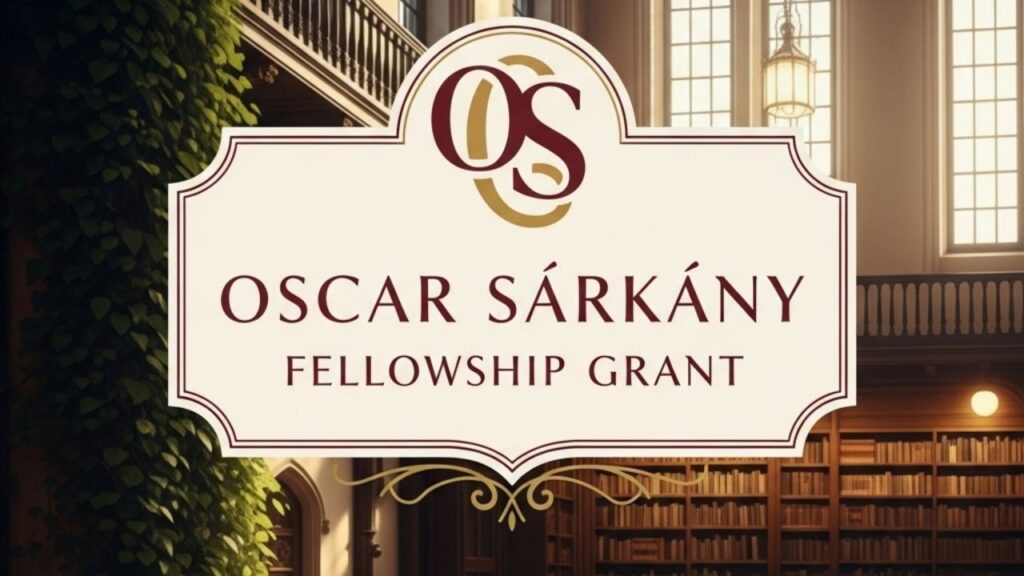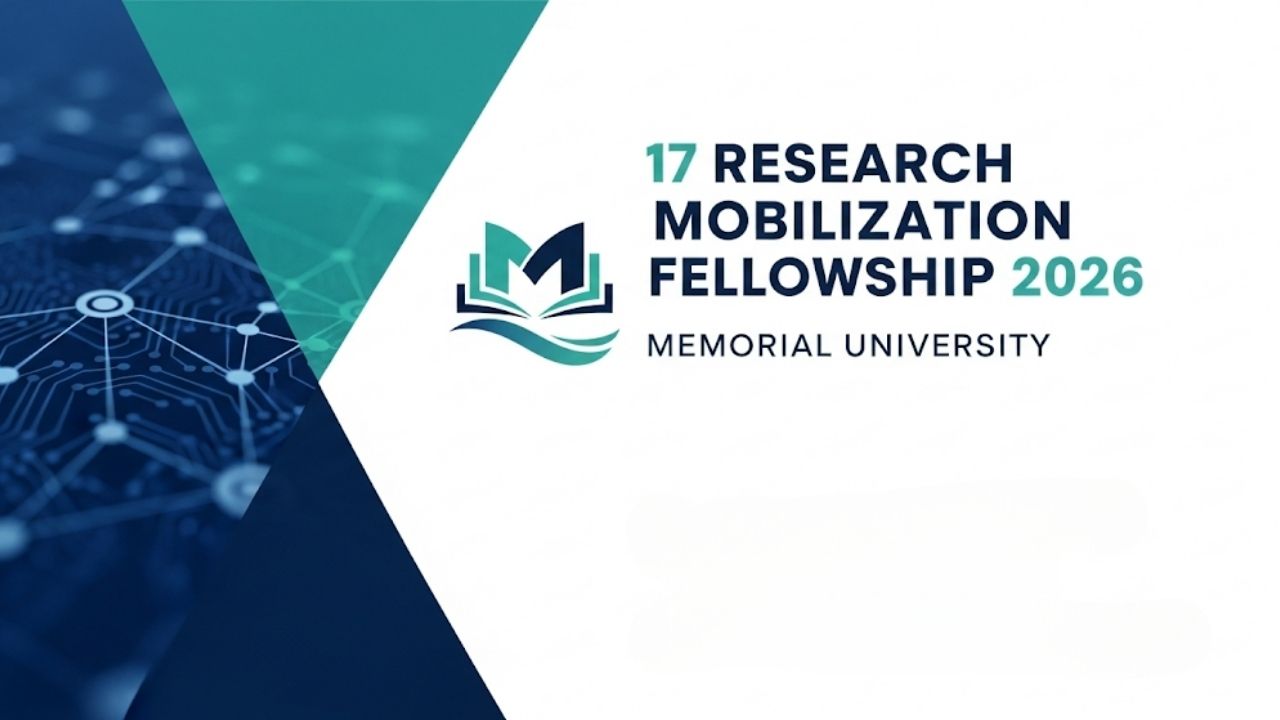The Oscar Sárkány Fellowship Grant 2025/2026 is now officially open for applications, offering an unparalleled opportunity for scholars to advance their research in the humanities and social sciences. This prestigious fellowship, initiated in 2025, commemorates Oszkár Sárkány (1912–1943), a Hungarian Bohemist who championed an inclusive and transnational perspective on cultural history, with strong ties to French developments in the humanities and social sciences. Tragically, he died young during World War II in a punishment battalion. The fellowship seeks to honor his legacy by supporting research that promotes new perspectives and fosters international collaboration.

Jointly offered by the Central European University Institute for Advanced Studies (CEU IAS) and the Parisian Institut d’études avancées (Paris IEA) in partnership with the French Research Center in Humanities and Social Sciences (CEFRES), this grant provides invaluable mobility to Budapest (for IEA fellows) and Paris (for CEU IAS fellows). It’s an opportunity to immerse yourself in vibrant academic environments, engage with leading thinkers, and bring your research to new heights.
Why the Oscar Sárkány Fellowship Stands Out
What truly sets the Oscar Sárkány Fellowship apart is its commitment to fostering interdisciplinary research and international academic exchange. It’s designed not just to fund projects, but to cultivate a new generation of scholars who can bridge geographical and conceptual divides. In my experience advising students, one common hurdle is finding fellowships that offer both financial support and genuine intellectual community. This fellowship addresses both, providing a robust framework for scholarly growth.
The program aims to support research that aligns with a preferred scope for 2025, including themes such as Central-Eastern Europe, illiberalism (global and local), and the crucial issues of scholars at risk, academic freedom, and the concept of the “invisible university.” These themes reflect contemporary global challenges, offering fellows the chance to contribute to timely and impactful discussions.
Eligibility: Are You the Ideal Candidate?
To be considered for the Oscar Sárkány Fellowship Grant 2025/2026, prospective applicants must meet specific criteria. While the official call for applications provides the definitive details, generally, these fellowships are aimed at postdoctoral researchers and established scholars in the humanities and social sciences.
For IAS CEU fellows wishing to pursue research in Paris:
- Opening of the Call: July 14, 2025
- Deadline for Submissions: September 15, 2025, 23:59 CET
- Publication of Results: September 30, 2025
- Duration: 1 month in Paris
- Suggested Mobility Period: 2025/2026 academic year, preferably Spring 2026
For CNRS fellows wishing to pursue research at IAS CEU Budapest:
- Opening of the Call: July 20, 2025
- Deadline for Submissions: October 15, 2025
- Publication of Results: October 25, 2025
- Duration: 15 days in Budapest
- Suggested Mobility Period: 2025/2026 academic year, preferably Spring 2026
It’s crucial to confirm specific requirements directly from the official CEFRES website, as eligibility criteria can vary slightly between fellowship calls. For example, some fellowships may require a PhD obtained within a certain timeframe, while others might be open to more experienced researchers. Always check the fine print!
The Application Journey: Your Path to Success
Navigating any fellowship application can feel daunting, but breaking it down into manageable steps makes the process far less intimidating. Here’s a strategic approach to completing your Oscar Sárkány Fellowship Grant application with confidence:
- Thorough Research is Key: Before you even begin writing, fully understand the fellowship’s objectives, its historical context, and the specific research themes it prioritizes. This will allow you to tailor your application precisely to what the selection committee is seeking. For instance, the fellowship’s connection to Oszkár Sárkány’s legacy suggests a preference for projects that demonstrate intellectual bravery, interdisciplinary thinking, and a commitment to understanding complex cultural and historical narratives.
- Crafting a Compelling Research Proposal: This is arguably the most critical component of your application. Your proposal should clearly articulate your research question, methodology, expected outcomes, and how your project aligns with the fellowship’s objectives and preferred research scope.
- Clarity and Conciseness: While your ideas may be complex, present them in a clear, accessible manner. Avoid jargon where possible, or explain it clearly.
- Originality and Impact: Highlight the originality of your research and its potential impact within your field and beyond. How will your work contribute to current academic debates or address pressing societal issues?
- Feasibility: Demonstrate that your proposed research is achievable within the fellowship’s timeframe and with the resources available.
- Fit with Host Institutions: Explain why a residency at CEU IAS or Paris IEA is essential for your research. Do they offer specific archives, faculty expertise, or intellectual communities that are vital to your project?
- The Power of Your Curriculum Vitae (CV): Your CV should be more than just a list of accomplishments; it’s a narrative of your academic journey. Ensure it highlights relevant publications, research experience, international collaborations, and any teaching or mentorship roles you’ve held. For junior scholars, demonstrating participation in projects, conferences, or peer-reviewed publications is particularly important.
- Letters of Recommendation: Choose referees who know your work intimately and can speak to your intellectual abilities, research potential, and suitability for an international fellowship. Provide them with ample time and all necessary information (your CV, research proposal, and the fellowship details) to write strong, specific letters.
- The Personal Statement/Motivation Letter: This is your chance to convey your passion for your research and your vision for how the fellowship will shape your future. Share your story, your motivations, and how this specific opportunity fits into your long-term academic goals. I’ve seen many successful applicants truly shine by focusing on the “why” behind their research and their genuine desire to contribute to the broader academic community.
- Adherence to Guidelines: Pay meticulous attention to all application instructions, including formatting, word limits, and submission deadlines. An overlooked detail can unfortunately lead to an application being disqualified, no matter how brilliant your research.

The Benefits: Beyond Financial Support
The Oscar Sárkány Fellowship offers a comprehensive package designed to support fellows both professionally and personally.
For IAS CEU fellows undertaking their mobility in Paris:
- Accommodation: One month of accommodation at the prestigious Cité Universitaire, providing a vibrant international living and learning environment.
- Travel Costs: Coverage for travel expenses, alleviating a significant financial burden.
- Lump Sum for Daily Expenses: A stipend to cover daily living costs, allowing fellows to focus entirely on their research without financial worries.
For CNRS fellows undertaking their mobility in Budapest:
- Accommodation: 15 days of accommodation at the Wallenberg Guesthouse, offering comfortable and convenient lodging.
- Travel Costs: Travel costs covered by CEFRES.
- Office at IAS CEU: Access to a dedicated office space at IAS CEU, providing a professional and conducive environment for scholarly work.
Beyond these tangible benefits, the fellowship offers unparalleled access to world-class academic institutions, research networks, and intellectual discourse. Imagine the cross-pollination of ideas, the spontaneous collaborations, and the intellectual debates that arise from being part of such a dynamic community. This is where truly groundbreaking research often begins.

Hearing from the Experts: A Glimpse into the Fellowship Experience
While direct testimonials from Oscar Sárkány Fellowship recipients are still emerging given its recent launch, the caliber of the partnering institutions—CEU IAS, Paris IEA, and CEFRES—speaks volumes. These institutions have a long-standing history of hosting and nurturing top-tier talent.
Consider the enriching environment at the Central European University’s Institute for Advanced Study, known for its interdisciplinary approach and commitment to critical inquiry. Similarly, the Institut d’études avancées in Paris provides an exceptional platform for international scholarship in the humanities and social sciences. The French Research Center in Humanities and Social Sciences (CEFRES) also plays a pivotal role in facilitating research and academic exchange between France and Central Europe.
Maximizing Your Chances: Insider Tips
As someone who has guided numerous applicants through the fellowship process, I can offer a few additional pieces of advice:
- Start Early: Give yourself ample time to draft, revise, and refine your application materials. Rushing often leads to oversights and a less polished submission.
- Seek Feedback: Ask trusted mentors, colleagues, or even peers to review your proposal and personal statement. A fresh pair of eyes can catch errors and offer valuable suggestions for improvement.
- Connect with the Themes: Even if your research isn’t explicitly listed under the preferred scope, demonstrate how it connects to the broader aims of the fellowship, such as fostering transnational perspectives, promoting academic freedom, or addressing contemporary societal issues through humanistic inquiry.
- Highlight Mobility’s Value: Clearly explain why the mobility aspect of the fellowship is crucial for your research. Is it access to specific archives, collaboration with particular scholars, or immersion in a unique cultural context?
ICANN85 Fellowship Applications Now Open for the March 2026 Event
Global Health Emerging Scholars Fellowship 2026 for Foreign Applicants
FAQs
Q1: What is the primary purpose of the Oscar Sárkány Fellowship Grant?
The Oscar Sárkány Fellowship Grant aims to support innovative research in the humanities and social sciences, specifically fostering transnational and interdisciplinary perspectives. It also seeks to honor the legacy of Oszkár Sárkány by promoting academic freedom and supporting scholars who address contemporary global challenges, particularly those related to Central-Eastern Europe, illiberalism, and the concept of the “invisible university.”
Q2: Who is eligible to apply for the Oscar Sárkány Fellowship Grant?
Generally, the fellowship is open to postdoctoral researchers and established scholars in the humanities and social sciences. Specific eligibility criteria, such as the timeframe since PhD completion, may vary slightly between the CEU IAS and Paris IEA calls. It is essential to consult the official call for applications on the CEFRES website for the definitive and most up-to-date requirements for each mobility option.
Q3: What is the duration of the fellowship and where will I be based?
The fellowship offers two distinct mobility options. For IAS CEU fellows, the duration is typically one month in Paris. For CNRS fellows, the duration is 15 days in Budapest. The suggested mobility periods for 2025/2026 are preferably Spring 2026 for Paris and Spring 2026 for Budapest, though these are subject to final confirmation in the official call.










